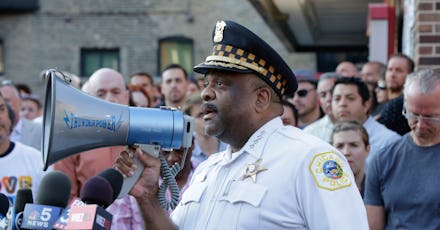Chicago announces dramatic changes to its policing policies

The Chicago Police Department on Wednesday announced major changes are on the way regarding the department's use of deadly force, a tone being set by top cops across the U.S. from New York to Los Angeles.
Chicago Police Superintendent Eddie T. Johnson's team told reporters his department's 12,000 officers will undergo "rigorous" conflict de-escalation training set to be completed by the fall of 2017. The training will include computer orientation and a four-hour in-person session, followed by an eight-hour scenario-based course in 2018, according to the Washington Post.
Deadly force, including chokeholds and weapon strikes to the head as well as the use of firearms must be used "only as a last resort," in accordance with the department's new policy.
"Department members will seek to de-escalate situations and will not resort to force unless all other reasonable alternatives have been exhausted or would clearly be ineffective under the circumstances," Chicago police told reporters, according to the Washington Post.
The pending changes come at a pivotal time for the city. Its murder rate reached a 19-year high in 2016. Its law enforcement image is still reeling following a critical Justice Department probe almost three years after one of its officers needlessly emptied his handgun's clip into the body of 17-year-old Laquan McDonald.
U.S. police have killed at least 369 people less than six months into 2017, a globally uncommon deadly pattern largely resulting from a rush to use deadly force that has been criticized by law enforcement reform groups from Black Lives Matter to police leaders themselves.
"This is an important step in the right direction for the department and our city," Lori Lightfoot, chair of the Chicago Police Accountability Task Force, told the Washington Post in a statement.
Chicago Fraternal Order of Police Lodge 7 President Kevin Graham denounced the department's changes in a Wednesday night blog post, pointing out that three Chicago officers have been shot in the last two weeks. Graham blames the city's "current anti-law enforcement climate," for emboldening criminals.
"Offenders, particularly gang members, are more combative and resistant to the police in the current anti-law enforcement climate," Graham wrote. "We do not believe that extensive changes should be made to the current Use of Force policy."
Other departments
Chicago isn't the only major law enforcement agency undergoing major reform efforts.
The New York Police Department in April launched a court-ordered body camera program. Police Commissioner James O'Neil and New York Mayor Bill de Blasio have advocated for a community policing model that emphasizes making officers a more visible part of the communities they serve, patrolling the streets to offer a visual deterrent to crime rather than focusing on arrest numbers.
Los Angeles' police commission in April adopted revisions to the LAPD's use of force guidelines, including, "the need to control an incident by using time, distance, communications and available resources, in an effort to de-escalate the situation, whenever it is safe and reasonable to do so," according to the L.A. Independent.
"This is a very difficult subject that has a number of stakeholders with very strong opinions," L.A. Police Chief Charlie Beck told reporters in an April statement, adding that the move was a "significant step forward."
Activists remain skeptical
Hawk Newsome, president of the Black Lives Matter Greater New York chapter, which he says is not affiliated with the official Black Lives Matter national network, expressed skepticism about the new police reforms.
"Because this is backed by most police chiefs across the country, I think that it's purely cosmetic," he told Mic in a Thursday phone interview. "Police enjoy a wide variety of freedoms they don't want to see inhibited."
Newsome pointed to the 2016 police shooting death of elderly, mentally ill Bronx-native Deborah Danner to bolster his point.
Commissioner James O'Neill told reporters in October that Sgt. Hugh Barry, the veteran officer who shot Danner after she allegedly attacked him with a bat, had previously received de-escalation training, but failed to follow it, according to CNN.
"What they need to have is 'how not to be a racist cop' training," Newsome told Mic. "I'm talking about bringing psychotherapists in and really evaluate these police officers and deal with them psychologically. Teach them how not to be racist. See if they have a propensity to commit violent acts, if they are the type of person who is likely to use excessive force."